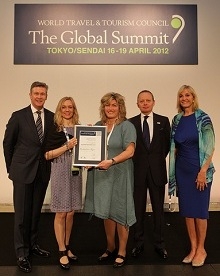WTTC Global Summit ends in Tokyo, 2013 summit in Abu Dhabi

Tokyo : President and CEO of the World Travel & Tourism Council (WTTC) David Scowsill, officially closed out the 12th annual Global Summit in Tokyo on April 19. Adressing the 1,200 delegates at the summit, Scowsill pointed out that travel and tourism is responsible for 255 million jobs and $6 trillion, which is 9 percent of global GDP.
“This makes us bigger than automotive, bigger than mining and bigger than manufacturing,” he said. “For every one dollar spent in travel and tourism, we generate three dollars to the economy.
“As an industry, we will continue to drive the sustainability agenda forward,” Scowsill said. “The leaders of WTTC are finding that the balance between people, planet and making profits is not only achievable, but essential for consumers and to every employee of their organizations. I believe that together we can become a force for good that is respected and welcomed by all — wherever our journey takes us. I believe we have started to show the kind of leadership that is befitting of an industry that can generate growth, jobs, prosperity and sustainability at both global and regional level, like no other industry on this planet can.”
The leaders of the travel and tourism industry attending the 12th Global Summit Tourism have committed to work together to have governments improve visa-entry procedures and systems in order to stimulate travel demand and create jobs.
The leaders from different sectors of the industry and regions agreed to speak with one voice to governments around the world compelling them to find better ways to balance the needs of sovereign security and the capacity of tourism to generate economic growth.
WTTC and the World Tourism Organization (UNWTO) have engaged in a study on the impact of visa facilitation on job creation across the G20 countries. That study will provide the data needed to press the arguments for action. This will be presented at the forthcoming May meeting of the Tourism Ministers of the G20 (Merida, Mexico) and will be used to provide input into the G20 world leaders meeting in Los Cabos, Mexico, in June as they look for alternatives to stimulate the economy and create jobs.
The first part of the 12th Global Travel & Tourism Summit, organised by the World Travel & Tourism Council (WTTC) in association with the Pacific Asia Travel Association (PATA), exceeded all expectations in terms of delegate attendance, local and international interest.
“We could not have come here at a more important time,” Anita Mendiratta, Sendai Summit anchor said. “One year ago, the disaster became a main focus of the world’s attention. But the world’s media and public came together in a show of solidarity. The Japanese people have shown strength of spirit and dignity.”
Mitsutake Otsuka, Vice Chairman, Japan Host Committee said the decision by WTTC to hold part of its Summit in Sendai will have a profound impact on the Japanese economy, especially since the dynamism of Travel & Tourism has been used to drive economic recovery. “I just want to say to you that Japan is alive and kicking,” he noted.
Martin Craigs, CEO of Pata said : “It’s a particular pleasure and privilege to be here to represent PATA. We have been working very closely since last year’s tragedy in support of PATA’s Japan Chapter, which first opened in 1962”.
A warm welcome from Masato Takahashi, Chairman of the Tohoku Tourism Promotion Organisation. “We are very grateful to WTTC for choosing Japan and, in particular, Sendai City for its Summit”. One year after the Great East Japan earthquake and tsunami, most of the region is open for tourism, including all hotels, except for the coastal region. But demand is down due to perceived problems, especially regarding false rumours concerning possible contamination from the nuclear power accident.
“Tohoku Province accounts for around 10% of population of Japan and is well known for the beauty of its nature – especially its hot springs, delicacies of land and sea. It is a destination for all seasons,” Takashi-san said.
One year on from Great East Japan earthquake, reconstruction still has some way to go but, according to Mr Takahashi, full recovery is expected by the end of this year. Reconstruction will be supported by Y200 trillion (US$220 billion) funding from the government.
Following a successful one-day event marking the start of the World Travel & Tourism’s 12th annual Global Summit in Japan, the Opening Ceremony of the second part, the two-day Tokyo plenary session, was honoured by the presence of His Excellency, Prime Minister Noda.
“It is just over one year since the Great East Japan earthquake and tsunami that caused unprecedented damage across the coastal region of Tohoku Province,” PM Noda said.
Those of you who have visited the site will have immediately noticed the progress that has been made in terms of recovery, the Prime Minister added. It is now important for us to “set free all the potential within Japan” in terms of tourism opportunities.
Fortunately, the PM noted, Japan – and the region damaged by the earthquake – is blessed with a rich variety of tourism attractions, which vary from season to season. The coastal region and the attractions of the sea are of particular significance.
“I am confident in the power of tourism. It creates new income, new jobs and vitalises the economy, but it also develops trust among people from across different borders.Japan has many attractions for tourists, not least its food and sake!”,he said.
Tourism for Tomorrow Awards
Three companies and one destination, from four continents, have been recognised for their best practices in sustainable tourism at this year’s World Travel & Tourism Council’s (WTTC) Tourism for Tomorrow Awards.
The four winners were selected from 12 Award finalists and announced onstage during the opening ceremony of the WTTC Global Summit in Tokyo, Japan on 17 April.
The WTTC Tourism for Tomorrow Awards are among the highest accolades in the Travel & Tourism industry, and recognise companies, organisations and destinations around the world which showcase outstanding sustainable tourism achievements. They are the only global sustainable tourism awards that include on-site evaluation inspections of all finalists, conducted by a team of expert international judges.
The 2012 Tourism for Tomorrow Awards winners hail from South America, North America, Europe, and Asia. These diverse set of winners and emerged as victors over 150 entries from more than 60 countries.
The winners are:
Community Benefit Award – Saunders Hotel Group, USA: – This local family-owned hotel group has been a leader in sustainable tourism practices as far back as the early 1980s, when they converted an old police building in Boston, Massachusetts into an historic hotel and worked with local community partners to build affordable housing in the same area. Through initiatives that are driven and supported by all levels of their staff, the group supports dozens of local charity and non-profit groups with a combination of financial backing, volunteer time, and in-kind resources that goes far beyond most corporate social responsibility efforts. For Saunders, community service begins at ‘home’, where helping people in need is part of the company mission, recognising that disadvantaged communities can also exist in a major city in the United States.
Conservation Award – Inkaterra, Peru: This hotel boasts long term conservation stewardship of 38,000 acres of rainforest in the Amazon basin and 25 acres of cloud forest within the Machu Picchu Historical Sanctuary. Founded in 1975, Inkaterra has grown into a renowned biodiversity research and conservation tourism company operating five hotels in the Sanctuary of Machu Picchu and the Madre de Dios area of the Amazon rainforest. As well as a 100% carbon neutral hotel stay for every guest, Inkaterra has continued to implement a host of self-supported, sustainable tourism projects to facilitate a better understanding among tourists and local peoples about the need to protect fragile habitats in the Andes and the Amazon of Peru, which is home to 84 of the world’s 104 identified ecological life zones.
Destination Stewardship Award – Destination Røros, Norway: Their successful multi-stakeholder approach to creating a thriving sustainable tourism destination in the old mining town of Røros, a UNESCO World Heritage Site is an example for many to follow. Since the end of mining in the late 1970’s, Destination Røros has been instrumental in reversing the area’s environmental degradation, guided by a management plan that actively engages and builds cooperation among local communities, municipal authorities, and private sector stakeholders. Emphasis is placed on demonstrating that historical cultural sites and formerly degraded natural areas can be revitalised and utilised in new contexts through sustainable development, thereby bringing tangible economic benefits to the local people. Destination Røros is also a pilot project for Norway’s country-wide Sustainable Tourism Initiative.
Global Tourism Business Award – Banyan Tree Hotels & Resorts, headquartered in Singapore: Their longstanding commitment to sustainability and creating tourism value recognition among stakeholders to support the protection of diverse natural and cultural heritage in worldwide destinations ranging from Mexico to China. Banyan Tree works through a three-pillar strategy: enhancing efficiency in environmental operations, conserving natural heritage and biodiversity, and social and economic empowerment of local people in the countries and regions where they operate. In addition to strong sustainable tourism practices, Banyan Tree has also fully integrated sustainability monitoring and evaluation across the company including its annual reports, in addition to issuing annual stand-alone sustainability performance reports that document projects, successes, and challenges. They have successfully done this for more than a decade, while also being one of the first global hospitality companies in the world to ban the sale of shark’s fin in all of their hotels in 2006.
David Scowsill, President & CEO, WTTC, said: ‘The Awards have been under WTTC’s stewardship for the last nine years. Since then, they have grown in calibre and reach, but the premise is the same: to give international recognition to outstanding examples of sustainable practices, from Travel & Tourism businesses across the globe.’
David continued: ‘All finalists and winners are inspiring cases of businesses providing sustainable solutions to real world problems. These actions espouse the ethos of Tourism for Tomorrow, and demonstrate true leadership in the industry.’
Commenting on their achievements, Costas Christ, Chairman of Judges, WTTC Tourism for Tomorrow Awards, noted: ‘Sustainable tourism principles are no longer solely the realm of a handful of well-meaning companies. Today, sustainability itself has emerged on the global stage as a new indicator of tourism quality, alongside traditional quality standards such as excellent guest services or a room with a view. What this means is that a measure of a company or tourism destination’s success, is now increasingly tied to their quality of sustainable tourism best practice. This is not a passing trend, but rather a positive and needed evolution of the tourism industry. The winners of this year’s Tourism for Tomorrow Awards exemplify how tourism, when planned and managed well, can be a tremendous opportunity to help safeguard our planet and deliver tangible benefits to local people.’
The Tourism for Tomorrow winners underwent a rigorous four-step judging process by more than 20 independent judges from around the world, led by Costas Christ, a globally recognised expert in sustainable tourism.
The World Travel & Tourism Council (WTTC) announced that it will hold its 13th Global Summit in Abu Dhabi in 8-10 April 2013. Abu Dhabi Tourism Authority (ADTA) and Etihad Airways will be official hosts of the biggest annual gathering of Travel & Tourism leaders.-WTTC














